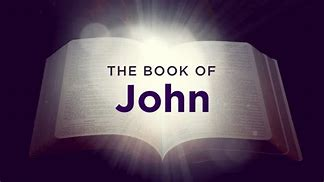Jesus Appears to Seven Disciples - {Interlinear <Greek>}
21:1 - After {Μετὰ <meta>} this {ταῦτα <houtos>} Jesus {ὁ Ἰησοῦς <ho Iēsous>} revealed {ἐφανέρωσεν <phaneroō>} himself {ἑαυτὸν <heautou>} again {πάλιν <palin>} to → the {τοῖς <ho>} disciples {μαθηταῖς <mathētēs>} by {ἐπὶ <epi>} the {τῆς <ho>} Sea {θαλάσσης <thalassa>} of → Tiberias, {τῆς Τιβεριάδος· <ho Tiberias>} and {δὲ <de>} he → revealed {ἐφανέρωσεν <phaneroō>} himself • in this way. {οὕτως. <houtōs>}
21:2 - Simon {Σίμων <Simōn>} Peter, {Πέτρος, <Petros>} • {καὶ <kai>} Thomas {Θωμᾶς <Thōmas>} (called {ὁ λεγόμενος <ho legō>} the → Twin), {Δίδυμος, <didymos>} • {καὶ <kai>} Nathanael {Ναθαναὴλ <Nathanaēl>} • {ὁ <ho>} of {ἀπὸ <apo>} Cana {Κανᾶ <Kana>} in → Galilee, {τῆς Γαλιλαίας, <ho Galilaia>} • {καὶ <kai>} the • sons • • {οἱ <ho>} of → Zebedee, {τοῦ Ζεβεδαίου, <ho Zebedaios>} and {καὶ <kai>} two {δύο. <dyo>} others {ἄλλοι <allos>} of {ἐκ <ek>} his {αὐτοῦ <autos>} disciples {τῶν μαθητῶν <ho mathētēs>} were {ἦσαν <eimi>} together. {ὁμοῦ <homou>}
21:3 - Simon {Σίμων <Simōn>} Peter {Πέτρος· <Petros>} said {λέγει <legō>} to → them, {αὐτοῖς <autos>} “I → am → going {ὑπάγω <hypagō>} fishing.” {ἁλιεύειν. <halieuō>} They → said {λέγουσιν <legō>} to → him, {αὐτῷ· <autos>} “We {ἡμεῖς <egō>} will → go {ἐρχόμεθα <erchomai>} • {καὶ <kai>} with {σὺν <syn>} you.” {σοί. <sy>} They went out {ἐξῆλθον <exerchomai>} and {καὶ <kai>} got {ἐνέβησαν <embainō>} into {εἰς <eis>} the {τὸ <ho>} boat, {πλοῖον, <ploion>} but {καὶ <kai>} • {ἐν <en>} that {ἐκείνῃ <ekeinos>} night {τῇ νυκτὶ <ho nyx>} they → caught {ἐπίασαν <piazō>} nothing. {οὐδέν. <oudeis>}
21:4 - • {δὲ <de>} Just as {ἤδη <ēdē>} day was breaking, {πρωΐας γενομένης <prōia ginomai>} Jesus {Ἰησοῦς <Iēsous>} stood {ἔστη <histēmi>} on {εἰς <eis>} the {τὸν <ho> shore; {αἰγιαλόν· <aigialos>} yet {μέντοι <mentoi>} the {οἱ <ho>} disciples {μαθηταὶ <mathētēs>} did → not {οὐ <ou>} know {ᾔδεισαν <oida>} that {ὅτι <hoti>} it → was {ἐστιν. <eimi>} Jesus. {Ἰησοῦς <Iēsous>}
21:5 - • {οὖν <oun>} Jesus {ὁ Ἰησοῦς· <ho Iēsous>} said {Λέγει <legō>} to → them, {αὐτοῖς <autos>} “Children, {παιδία, <paidion>} do → you → have {ἔχετε; <echō>} any {τι <tis>} fish {προσφάγιον <prosphagion>} ?” {μή <mē>} They → answered {ἀπεκρίθησαν <apokrinomai>} him, {αὐτῷ· <autos>} “No.” {οὔ. <ou>}
21:6 - He {ὁ <ho>} • {δὲ <de>} said {εἶπεν <legō>} to → them, {αὐτοῖς· <autos>} “Cast {βάλετε <ballō>} the {τὸ <ho>} net {δίκτυον <diktyon>} on {εἰς <eis>} the {τὰ <ho>} right {δεξιὰ <dexios>} side {μέρη <meros>} of → the {τοῦ <ho>} boat, {πλοίου <ploion>} and {καὶ <kai>} you → will → find {εὑρήσετε. <heuriskō>} some.” • So {οὖν, <oun>} they → cast {ἔβαλον <ballō>} it, • and {καὶ <kai>} now → they → were → not {οὐκέτι <ouketi>} able {ἴσχυον <ischyō>} to → haul {ἑλκύσαι <helkō>} it {αὐτὸ <autos>} in, ← because of {ἀπὸ <apo>} the {τοῦ <ho>} quantity {πλήθους <plēthos>} of → fish. {τῶν ἰχθύων. <ho ichthys>}
21:7 - That {ἐκεῖνος <ekeinos>} disciple {ὁ μαθητὴς <ho mathētēs>} whom {ὃν<hos>}
Jesus {ὁ Ἰησοῦς <ho Iēsous>} loved {ἠγάπα <agapaō>} therefore {οὖν <oun>} said {λέγει <legō>} to → Peter, {τῷ Πέτρῳ· <ho Petros>} “It → is {ἐστιν. <eimi>} the {ὁ <ho>} Lord!” {κύριός <kyrios>} When → Simon {Σίμων <Simōn>} • {οὖν <oun>} Peter {Πέτρος <Petros>} heard {ἀκούσας <akouō>} that {ὅτι <hoti>} it → was {ἐστιν <eimi>} the {ὁ <ho>} Lord, {κύριός <kyrios>} he put on {διεζώσατο,<diazōnnymi>} his • outer garment, {τὸν ἐπενδύτην <ho ependytēs>} for {γὰρ <gar>} he → was {ἦν <eimi>} stripped {γυμνός, <gymnos>} for • work, • and {καὶ <kai>} threw {ἔβαλεν <ballō>} himself {ἑαυτὸν <heautou>} into {εἰς <eis>} the {τὴν <ho>} sea. {θάλασσαν. <thalassa>}
21:8 - The {οἱ <ho>} • {δὲ <de>} other {ἄλλοι <allos>} disciples {μαθηταὶ <mathētēs>} came {ἦλθον· <erchomai>} in → the {τῷ <ho>} boat, {πλοιαρίῳ <ploiarion>} dragging {σύροντες <syrō>} the {τὸ <ho>} net {δίκτυον <diktyon>} full • of → fish, {τῶν ἰχθύων. <ho ichthys>} for {γὰρ <gar>} they → were {ἦσαν <eimi>} not {οὐ <ou>} far {μακρὰν <makros>} from {ἀπὸ <apo>} the {τῆς <ho>} land, {γῆς <gē>} but {ἀλλὰ <alla>} about {ὡς <hōs>} a hundred yards {πηχῶν διακοσίων <pēchys diakosioi>} off. {ἀπὸ <apo>}

After writing what appears to be the perfect ending for his Gospel (20:30–31), John adds an epilogue which demonstrates that we never really come to the end of the gospel. We will never outgrow our need for the grace of Jesus.
Just as the apostle Paul would continue to make tents, so the apostles who preceded him continued to be fishermen. Whatever our vocation, Jesus meets us there, but he doesn’t leave what we do untouched. Fishers of fish are also called to be fishers of men (Matt. 4:19), and both require Jesus. Peter hauled 153 fish ashore only because Jesus filled the nets. Peter would see 3,000 conversions on the day of Pentecost (Acts 2:41) only because Jesus is filling his church. Without him we can do nothing (John 15:5).
References:
All contents are reposted from ESV.org.
“Scripture quotations are from The ESV® Bible (The Holy Bible, English Standard Version®), copyright © 2001 by Crossway, a publishing ministry of Good News Publishers. Used by permission.
All rights reserved.”
Commentaires